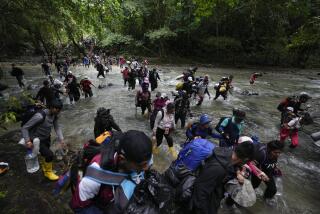Panama’s Opposition Tells U.S. That Noriega Must Go
- Share via
PANAMA CITY — Opposition leaders in Panama have told a U.S. State Department envoy that no talks with the Panamanian government can go forward unless military ruler Gen. Manuel A. Noriega steps down.
Panamanian opposition politicians voiced their opinions Wednesday during a series of meetings with William G. Walker, the deputy assistant secretary for Central America and deputy director for Panamanian Affairs. Walker arrived here Tuesday on a fact-finding visit in the midst of Panama’s political turmoil.
Last week, the Panamanian government, through U.S. Embassy emissaries, invited opposition leaders to discuss such common complaints as electoral fraud and corruption in the Panamanian court system in an effort to end five weeks of anti-government protests.
Resignation Demanded
The growing opposition movement refused the invitations, demanding instead that Noriega resign as head of Panama’s Defense Forces while charges that he has been involved in political assassination, corruption and electoral fraud are investigated by an independent commission.
As head of the 20,000-member Defense Forces, Noriega is widely considered the real power behind the civilian government of President Eric A. Delvalle.
The precondition that Noriega must go before talks can begin was unanimous among the opposition leaders who met Walker on Wednesday, according to several participants. Walker spoke with leaders of the self-styled National Civic Crusade, which has led the move to oust Noriega, and of three opposition political parties--the Christian Democratic, the Molirena and the Authentic Panamanian.
A spokesman at the U.S. Embassy declined to comment on Walker’s activities except to say that he has also met with President Delvalle.
During at least one of Wednesday’s meetings with Walker, opposition politicians accused the United States of quietly supporting Noriega despite tough talk about a need to return Panama to democracy. The United States provides $33 million in annual aid to Panama, $6 million of that in military assistance.
Another participant charged that because the United States values stability in Panama in order to ensure the smooth running of the Panama Canal, it had tolerated Noriega’s alleged misdeeds.
“We said, ‘The U.S. has created the monster,’ ” the participant recounted.
At another of the meetings, participants said Walker asked if opponents of the government would agree to hold talks with either Delvalle or Noriega. The Panamanians rejected negotiations with Delvalle because they consider him powerless and with Noriega because they want him to step down.
Stable Government Preferred
“We told Walker that the demonstrations will go on and that Noriega must leave,” said one participant in the meetings. “The U.S. would help by publicly withdrawing support from Noriega. Such a declaration would have great psychological impact.”
The Reagan Administration has called for clean elections and a return to civilian rule in Panama. The United States is scheduled to turn over full control of the Panama Canal to Panama in the year 2000 and Washington would prefer a stable and friendly elected government in charge.
Thus far, however, the Administration has stopped short of pressing for Noriega’s ouster. Washington’s decision not to publicly repudiate Noriega has put it at odds with opponents of the general.
Nonetheless, the turmoil in Panama has at least temporarily altered the cozy relationship between the U.S. Army and the Panamanian Defense Forces. On July 10, the U.S. Southern Command, which heads the U.S. Army’s 10,000-troop garrison at the Panama Canal, ordered its maintenance troops to stop repairing equipment for Panama’s Defense Forces and not to release any new equipment.
“In essence, we do not support the PDF until we are told otherwise,” said a copy of the new order obtained by The Times.
Relationship Unchanged
A spokesman at the Southern Command refused to say why such an order was issued. The spokesman, William Ormsby, added that the “basic relationship” with Panaman’s military had not changed.
Sources at the U.S. Embassy said that American commanders were angered that the Defense Forces did nothing to protect the U.S. Embassy from a rock- and paint-throwing attack last month by pro-government demonstrators.
Panamanian government officials declined to discuss Walker’s talks with Noriega or Delvalle. In recent days, government officials have floated proposals to end the impasse with its opponents.
One proposal would alter the makeup of the country’s electoral tribunal and courts, presumably to reduce the number of Noriega sympathizers on both, a government source said. Changes might also be offered in ministries and agencies directed by military officers and Noriega associates, he said, but Noriega would remain as head of the Defense Forces.
More to Read
Sign up for Essential California
The most important California stories and recommendations in your inbox every morning.
You may occasionally receive promotional content from the Los Angeles Times.













